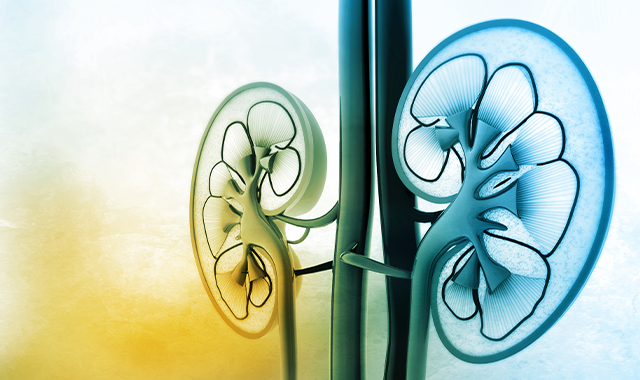Toripalimab Combo Receives Chinese Approval for Advanced RCC
Toripalimab plus axitinib is now an approved regimen in China for patients with medium- to high-risk unresectable or metastatic renal cell carcinoma.
The approval of the sNDA comes from the phase 3 RENOTORCH study (NCT04394975), which was conducted across 47 medical centers as the first immunotherapy study for advanced RCC in China.

China’s National Medical Products Administration has approved a supplemental new drug application (sNDA) for toripalimab (Tuoyi) plus axitinib (Inlyta) for patients with medium- to high-risk unresectable or metastatic renal cell carcinoma, according to a press release from Shanghai Junshi Biosciences.1
The approval of the sNDA comes from the phase 3 RENOTORCH study (NCT04394975), which was conducted across 47 medical centers as the first immunotherapy study for advanced RCC in China. Results were previously presented at the 2023 European Society for Medical Oncology Congress (ESMO).2
“From a global perspective, targeted therapy in combination with immunotherapy has become the standard treatment approach for advanced RCC,” Jun Guo, MD, PhD, a professor from Peking University Cancer Hospital, said in the press release.1 “However, no such treatments have been approved in China. The approval of toripalimab’s new indications opens a new chapter in combined targeted therapy and immunotherapy in China, and it will transform current clinical practices for advanced RCC and introduce new treatment options for medium to high-risk patients.”
Progression-free survival (PFS) was significantly prolonged at 18.0 months in the combination arm vs sunitinib (Sutent) monotherapy at 9.8 months (P = .0028). Of note, the risk of disease progression or death was reduced by 35% with the toripalimab combo (HR, 0.65; 95% CI, 0.49-0.86). In the combination arm, the objective response rate (ORR) was 56.7% compared with 30.8% in the sunitinib arm (P <.0001).
In the toripalimab plus axitinib arm, the median duration of response (DOR) was not reached (NR) vs 16.7 months in the sunitinib arm (HR, 0.61). The median overall survival (OS) in the combination arm was NR compared with 26.8 months in the monotherapy arm. The risk of death was reduced by 39% (HR, 0.61; 95% CI, 0.40-0.92).
Safety remained consistent and tolerable with toripalimab and axitinib.
“The treatment methods for advanced RCC are limited, especially for patients who are medium- to high-risk, who often [have] suboptimal prognoses,” Yiran Huang, a professor from Renji Hospital Affiliated with Shanghai Jiao Tong University School of Medicine, said.1 “The approval of toripalimab combined with axitinib addresses the gap in first-line immunotherapy for renal cancer in China. Compared [with] targeted monotherapy, toripalimab combined with targeted therapy will significantly improve patients’ PFS, offering promising prospects for many patients with advanced RCC in China.”
A total of 421 patients were randomly assigned 1:1 to receive toripalimab plus axitinib (n = 210) or sunitinib monotherapy (n = 211).3 Patients were given 240 mg of toripalimab intravenously every 3 weeks plus axitinib at 5 mg orally twice a day. Sunitinib was given at 50 mg orally once a day for 4 weeks and paused treatment for 2 weeks, or was given once daily for 2 weeks followed by 1 week off.
The primary end point was PFS assessed by an independent review committee. Secondary end points included PFS via investigators, ORR, DOR, and OS.
The press release also outlined that toripalimab is currently approved in China under 8 indications. It is used as monotherapy or in combination with other agents to treat cancers including nasopharyngeal carcinoma, urothelial carcinoma, esophageal squamous cell carcinoma, and non–small cell lung cancer.
“Thank you to all medical professionals, patients, and research and development personnel involved in the RENOTORCH study for their contributions,” said Jianjun Zou, MD, Global Research and Development President at Junshi Biosciences.1 “Their dedication has led to a pioneering breakthrough in renal cancer, the first of its kind in China.”
References
- Junshi Biosciences announces approval of the sNDA for toripalimab for the 1st-line treatment of renal cancer. News release. Shanghai Junshi Biosciences. April 7, 2024. Accessed April 10, 2024. https://shorturl.at/qSTY1
- Yan XQ, Ye MJ, Zou Q, et al. Toripalimab plus axitinib versus sunitinib as first-line treatment for advanced renal cell carcinoma: RENOTORCH, a randomized, open-label, phase III study. Ann Oncol. 2024;35(2):190-199. doi:10.1016/j.annonc.2023.09.3108
- Study to evaluate the efficacy and safety of toripalimab in combination with axitinib versus sunitinib monotherapy in advanced renal cell cancer. ClinicalTrials.gov. Accessed April 10, 2024. https://shorturl.at/eSX09
Newsletter
Stay up to date on recent advances in the multidisciplinary approach to cancer.